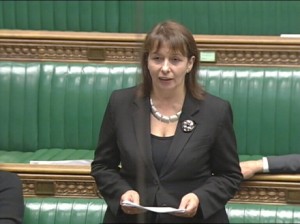 Teresa again spoke out against the Government’s accelerated timetable for the equalisation of the State Pension Age between men and women during the debate on the second reading of the Pensions Bill on 20 June.
Teresa again spoke out against the Government’s accelerated timetable for the equalisation of the State Pension Age between men and women during the debate on the second reading of the Pensions Bill on 20 June.
She urged the Secretary of State for Work and Pensions Iain Duncan Smith to rethink his proposal, which will mean that many women in their fifties will have to wait up to 2 years longer to get their pension without having had enough time to plan. Teresa voted against giving the Bill its second reading. Unfortunately the House voted the Bill through 302 votes to 232 and it will now proceed to committee. Following the pressure that has been placed on him, the Work and Pensions Secretary said he would be looking at “transitional arrangements”, which is promising, and Labour MPs will be holding him to this in the Committee Stage.
During the debate Teresa also raised questions about the implementation of plans to automatically enrol more people in a pension scheme called the National Employment Savings Trust (NEST).
During the debate Teresa said:
Like many Members, I have been inundated with e-mails and letters from women who will be affected by the acceleration in the state pension age. I declare an interest, in that I was born between 1953 and 1955, and will have to wait longer for my pension.
Last month I held a 90-minute Westminster Hall debate in which I outlined my opposition to the Government’s plans. The arguments that I put forward then still hold. The Government’s proposals are unfair, because they target a group of women based on when they were born and give them too little time to plan. These are women who have done the right thing—they have paid their national insurance contributions and planned for their retirement—and they should not be penalised by a Government who are moving the goalposts at the last minute. The Government are threatening to undermine confidence in the pensions system and some of the more positive proposals in the Pensions Bill, such as auto-enrolment, that are designed to improve pension coverage. However, people may think, “If the goalposts are moved at the last minute, why bother? We may make our contributions now, but who’s to say that the money will be there at the end, when we expect it?” That is the opposite of the Government’s intentions for pension reform, but it is a distinct possibility.
When I held my Adjournment debate, not a single Conservative MP spoke. I am encouraged that we have had such thoughtful and wide-ranging contributions from all parts of the House on this important issue today. I also hope that the opposition expressed in this debate will cause Ministers to pause and rethink their plans. My early-day motion on the issue has gathered 177 signatures from all political parties, so there is widespread support in the House for a rethink.
I would like to touch on the Secretary of State’s comments in today’s media. He said that it would cost in the region of £10 billion to drop the accelerated timetable, and that he would therefore stick to his plans.The Bill’s regulatory impact assessment says that the proposal will save no money before 2016, by which time the Chancellor says that he will have balanced the books. I am therefore unsure what the Secretary of State means. Is this about deficit reduction, or is it about fairness and equality?
I would like to touch on some issues that have already been covered and put some further questions to the Minister. What assessment has his Department made of the proposal’s effect on the number of unpaid carers and child minders in the UK? The accelerated timetable means that many people who would have taken up caring for relatives or provided child care when they retired, in order that the next generation could join the work force, will not be able to do so because they will be at work for another two years. That will have an important social policy impact. What assessment has the Department made of the proposal’s effect on volunteering and the Government’s big society agenda? People who have retired are not inactive; they volunteer at libraries, charity shops and lunch clubs. They also act as school governors and provide much needed care in our communities. If they are kept in the labour market for longer, they will be less able to volunteer in those ways.
I am also deeply concerned about unemployment among the over-50s. It is not easy for the women affected by the proposal to get another job or increase their hours to fill the two-year gap if they find themselves out of work, especially at such short notice. I receive many letters from constituents in their 50s who are willing to take any kind of work, but who are finding it impossible to get a job. It is not easy for people to return to the labour market once they have left. It is also becoming increasingly difficult to hang on to a job in later years. If women are expected to work longer, there needs to be work for them to do. That is particularly important given the current economic situation and the rise in unemployment. In looking for work, those women may well be competing against their own grandchildren in the labour market.
What projections and costings have the Government made for how many women affected by the proposal will have to claim employment-related benefits? Many women will not have enough savings to fall back on, particularly those who have been employed in low-paid work or who have taken time out to have children or act as carers. Will the Minister outline the measures that the Government plan to introduce to help them work longer? Will he comment on how women who are not in work are meant to balance their finances in the two-year gap, given that they will be eligible for jobseeker’s allowance for only six months if they have savings or will not be eligible at all—this is my understanding—if they have a small occupational pension?
I was going to mention some of the class issues affecting people’s life expectancy, but my right hon. Friend the Member for Croydon North (Malcolm Wicks), who is no longer in his place, went into that in great detail, and much better than I could. I would therefore like to end by asking the Minister about auto-enrolment and NEST—the national employment savings trust—which I broadly support. The three-month waiting period will mean that 500,000 fewer people will be automatically enrolled in a pension scheme. It is my understanding that workers will be able to opt in during that three-month period and receive the employer contribution, but people will do so only if they know that they have that right. Will the Minister assure the House that the regulations will require employers to explain that to jobholders from day one of their employment?
It is disappointing that NEST will not be allowed to deal with small transfers in and out, and sweep up small pensions from casual employment. Many people are employed dozens of times over their lives, many doing short-term jobs in, say, call centres. The reality is that we have a much more transient labour market. Provisions for transitions in and out of NEST should be included in the Bill, even if they cannot be implemented immediately. I very much look forward to the Minister’s response on those two issues.
The full Hansard record of the debate can be found here. Thousands of people have already signed a petition against the Government’s plans on the accelerated timetable. You can add your name by clicking here.

